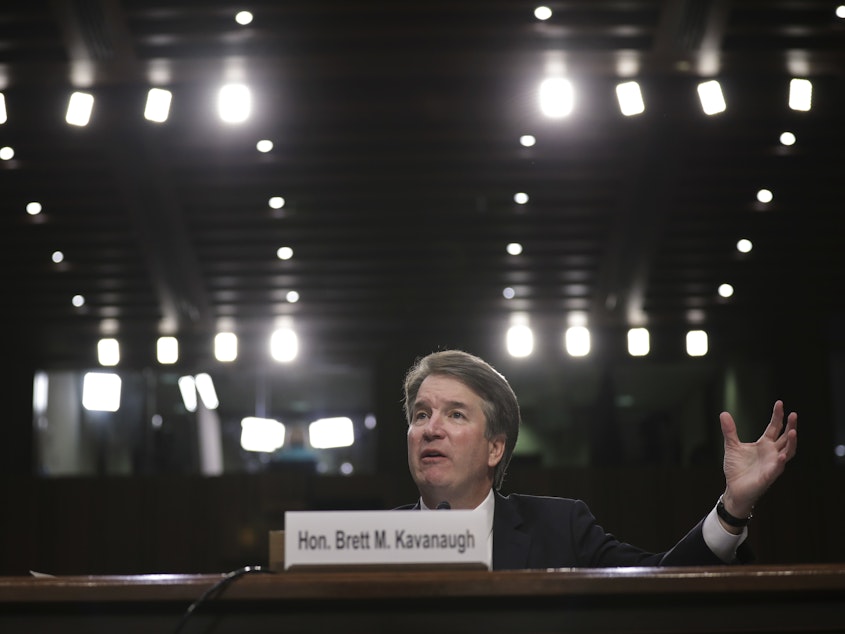Democrats Refer Kavanaugh Allegations To FBI, Deepening Divide Over His Nomination

Updated 4:24 p.m. ET
The White House is accusing Senate Democrats of an unfounded "11th hour attempt to delay" a vote on the nomination of Brett Kavanaugh to the U.S. Supreme Court.
Sen. Dianne Feinstein of California, the ranking Democrat on the Senate Judiciary Committee, released a statement Thursday afternoon disclosing that she had referred "a matter" involving Kavanaugh to "federal investigative authorities."
Democratic sources said the "matter" involved allegations against Kavanaugh made by a California woman about conduct that allegedly occurred in high school.
Feinstein said the individual "strongly requested confidentiality, declined to come forward or press the matter further, and I have honored that decision."
Feinstein had initially planned to keep the matter private, Democratic sources said, and did not disclose the allegations to other Democratic senators, but when word of the allegations began to leak out, she decided to turn the matter over to the FBI.
Sources added that Democrats feared that doing nothing would open them up to accusations of a cover-up.
White House spokesperson Kerri Kupec dismissed the episode as an obstructionist tactic.
"Throughout his confirmation process, Judge Kavanaugh has had 65 meetings with senators — including with Senator Feinstein," Kupec said, adding that Kavanaugh sat through 30 hours of testimony. But, she said, "Not until the eve of his confirmation has Sen. Feinstein or anyone raised the specter of new 'information' about him.
Kupec pointed out that throughout his 25 years of public service, Kavanaugh has been vetted by the FBI repeatedly.
Sen. John Cornyn of Texas, who also sits on the Judiciary Committee drove home that point with these tweets:
The Feinstein kerfuffle capped off a day of bitter partisan exchanges at a Senate Judiciary Committee meeting, with Democrats repeatedly seeking access to further documents from Kavanaugh's six years in the Bush White House, only to be shot down on repeated party-line votes.
"I don't understand the rush to judgment," said Feinstein, observing that when President Obama nominated Elena Kagan to the Supreme Court, "99 percent" of the documents "from her White House years" were turned over to the Judiciary Committee, compared to 7 percent of the Kavanaugh documents.
Feinstein charged that Republicans who are in charge of the committee had repeatedly refused her offer to work on a bipartisan basis to work with the National Archives so that more documents could be made available.
After a Feinstein motion to subpoena more documents failed on a party-line vote, there were five more party-line votes on various document questions. Sen. Amy Klobuchar of Minnesota, for instance, noted that the White House has invoked an unspecified constitutional privilege on 100,000 documents from Kavanaugh's two-plus years as associate White House counsel.
Klobuchar proposed that at the very least the White House should supply the traditional "privilege log," listing what privilege is being invoked for each document, and why.
Committee Chairman Chuck Grassley of Iowa said there was precedent for invoking executive privilege, that President Reagan invoked it on the nomination of Justice William Rehnquist to be chief justice.
But Sen. Patrick Leahy of Vermont, a Democrat and past chairman of the committee, rebutted that argument, noting that he, along with a bipartisan group of senators met with Reagan to object to the executive privilege claim, and that Reagan then withdrew it. Nonetheless, even the motion to subpoena a privilege log was voted down, along party lines.
Sen. Sheldon Whitehouse, D-R.I., accused the Republicans of compromising the Senate's constitutional duties for short-term political gain. Without access to this information, he said, the committee was setting a "damning precedent," leaving itself "neutered" and unable to perform its confirmation duties in a responsible way.
Republicans viewed such complaints as nothing more than an attempt to delay. Following committee rules, Grassley held over the committee vote on the Kavanaugh nomination for one week.
But he then announced the vote would take place Sept. 20 at 1:45 p.m. ET. That prompted an uproar from Democrats, who read out loud the committee rule requiring that committee debate on a nomination cannot be cut off without a majority vote that includes at least one member of the minority party.
Grassley overrode the objection, saying that his GOP colleague Orrin Hatch of Utah, another longtime committee member and former chairman, had once done something similar — and that was "precedent." [Copyright 2018 NPR]



